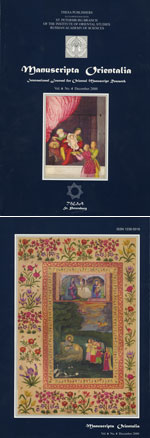|
|
| |

|

|
Pang T., G. Stary. On the Discovery of a Printed Manchu Text Based on Euclid's “Elements” // Manuscripta Orientalia. Vol. 6, No 4, December 2000. P. 49-56.
Matteo Ricci’s Chinese translation of the six books of Euclid’s Elements has rightly been considered a milestone in the history of the so-called “cultural exchange” between Europe and China. Published under the title Jige yuanben, this work attracted the attention of historians, mathematicians and linguists, and has recently become the object of a detailed study by the Dutch scholar Peter M. Engelfriet, to which we owe all bibliographical references.
The Manchu translation from the Chinese text was generally supposed to have been made by the Jesuit Ferdinand Verbiest (1623—1688) on order of the Kangxi Emperor, who evidently preferred to have access to such a complicated topic through his mother tongue, which seems to prove the supposition that, at least in Emperor’s younger years, Manchu was more familiar to him than Chinese. It was also supposed that only one copy of the Manchu version was made (that for the Emperor’s personal use), which could explain the very few researches on the topic were carried out both in China and Europe. In Europe, only one article entitled Euclide en chinois et mandchou by L. Vanhee was published in 1939. The author devoted just a few lines to the Manchu version…
 PDF-files PDF-files
The entire paper
Keywords
“Elements”
Euclid
the Kangxi Emperor
Manchu books
Manuscripta Orientalia, selected papers
|
|
|
|
Random news: Announcements |
|
The Eighteenth All-Russian Orientalist Seminar in memory of O.O. Rosenberg will be held at the IOM RAS on November 25–26, 2024. |
|
Read more...
|
|
|
|
|

